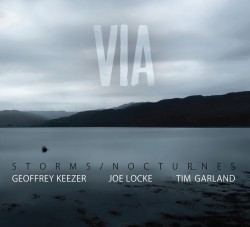MUSIC REVIEW BY Doug Simpson, Audiophile Audition
Saxophonist Tim Garland, pianist Geoffrey Keezer and vibraphonist Joe Locke ? who use the suggestive nomenclature Storms/Nocturnes ? have spent much time together but it has been seven years since the threesome have booked time to record, so their new album, Via, is a welcome return. The three friends first performed on Garland's 2000 solo release, Made by Walking, soon after Garland had joined Chick Corea's band Origin. Keezer, Garland and Locke's group name comes from their 2002 outing, called Storms/Nocturnes, which presented the trio's gift of blending sensitivity with expressive propulsion.
Via is genuine democracy at work. Locke and Garland penned three pieces respectively while Keezer contributed four. And the vibes/piano/sax format illustrates the musicians' interlaced instrumental nuances, complexities and acuity. Via has an overriding and inevitable sense of distance and place which is no surprise since Garland is from London, Keezer calls San Diego home and Locke can be found in New York City. The ten tracks are influenced by several environmental and geographical elements, including friend's homes in Vermont and Tuscany, a backyard garden tended by a spouse, and cozy jazz clubs in Montana and coastal California.
While much of the material is cushioned and relaxed, this is by no means a stifled project of reserve and reticence. There are numerous shifts in time and key signatures and the pieces often progress from unison performance to counterpoint to spontaneous improvisation only to repeat the process. An example is Keezer's "Daly Avenue," titled after a narrow road in Missoula, Montana which leads to a small jazz venue, DalyJazz. While the swinging tune employs the blues as a foundation the group produces unexpected harmonic alterations. Locke supplies a limber solo; Keezer adds an instinctively open walking bass line; and Garland's soprano sax circles inside, outside and around the melody. Locke's lithe "Miramar" was also stimulated by a jazz locale, the Douglas Beach House in Half Moon Bay, California. While Keezer's piano bubbles along, Locke brings a soulful vibe via his fluid vibes, evoking the sometimes languid and sometimes scuttled nature of the Pacific Ocean. The Douglas Beach House's ambience is replicated in the cut's latter half when Garland steps out forcefully with a tenor sax solo workout (he also utilizes bass clarinet to insert an atmospheric quality). The large Pacific expanse is more clearly delineated during Keezer's two-part "A Big Wavy Thing" and "Infinite Blue," two gentle, free-flowing compositions with echoed piano and sax as well as rhythmic push and pull from guest percussionist Derek Hook, who uses a log drum, wind chimes and crotales, which are small, tuned bronze or brass disks sometimes also called antique cymbals.
Engineer Luc Saint-Martin does a marvelous job spotlighting small details ? like the lingering last note of a piano or the tender tinkle of bells ? alongside brighter elements from the vibes, keyboards and sax. The mix richly benefits the arrangements, particularly ones ? such as "Lake of Weathers" and "Snowfall in Central Park" ? which have a graceful European flavor.
Via is genuine democracy at work. Locke and Garland penned three pieces respectively while Keezer contributed four. And the vibes/piano/sax format illustrates the musicians' interlaced instrumental nuances, complexities and acuity. Via has an overriding and inevitable sense of distance and place which is no surprise since Garland is from London, Keezer calls San Diego home and Locke can be found in New York City. The ten tracks are influenced by several environmental and geographical elements, including friend's homes in Vermont and Tuscany, a backyard garden tended by a spouse, and cozy jazz clubs in Montana and coastal California.
While much of the material is cushioned and relaxed, this is by no means a stifled project of reserve and reticence. There are numerous shifts in time and key signatures and the pieces often progress from unison performance to counterpoint to spontaneous improvisation only to repeat the process. An example is Keezer's "Daly Avenue," titled after a narrow road in Missoula, Montana which leads to a small jazz venue, DalyJazz. While the swinging tune employs the blues as a foundation the group produces unexpected harmonic alterations. Locke supplies a limber solo; Keezer adds an instinctively open walking bass line; and Garland's soprano sax circles inside, outside and around the melody. Locke's lithe "Miramar" was also stimulated by a jazz locale, the Douglas Beach House in Half Moon Bay, California. While Keezer's piano bubbles along, Locke brings a soulful vibe via his fluid vibes, evoking the sometimes languid and sometimes scuttled nature of the Pacific Ocean. The Douglas Beach House's ambience is replicated in the cut's latter half when Garland steps out forcefully with a tenor sax solo workout (he also utilizes bass clarinet to insert an atmospheric quality). The large Pacific expanse is more clearly delineated during Keezer's two-part "A Big Wavy Thing" and "Infinite Blue," two gentle, free-flowing compositions with echoed piano and sax as well as rhythmic push and pull from guest percussionist Derek Hook, who uses a log drum, wind chimes and crotales, which are small, tuned bronze or brass disks sometimes also called antique cymbals.
Engineer Luc Saint-Martin does a marvelous job spotlighting small details ? like the lingering last note of a piano or the tender tinkle of bells ? alongside brighter elements from the vibes, keyboards and sax. The mix richly benefits the arrangements, particularly ones ? such as "Lake of Weathers" and "Snowfall in Central Park" ? which have a graceful European flavor.
Soundclips
Other Reviews of
"VIA":
Cadence by Jerome Wilson
JazzTimes by David Whiteis
Jazz Society of Oregon by Kyle O'Brien
Ultimo L�beck (Germany) by Joachym Ettel
NDR Radio, Germany "Album of the Week" by Mauretta Heinzelmann
Mojo Magazine by Chris Ingham
All About Jazz.com by John Kelman
Jazzwise Magazine by Robert Shore
London Jazz by Frank Griffith
All Music Guide by Ken Dryden
